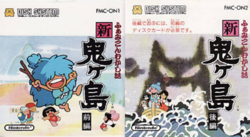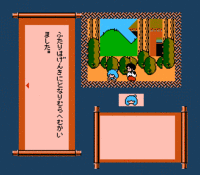Difference between revisions of "Shin Onigashima"
m |
|||
| Line 7: | Line 7: | ||
|publisher=[[Nintendo]] | |publisher=[[Nintendo]] | ||
|system=[[Famicom Disk System]], [[Super NES]], [[Game Boy Advance]],[[Virtual Console]], [[Wii U Virtual Console]] | |system=[[Famicom Disk System]], [[Super NES]], [[Game Boy Advance]],[[Virtual Console]], [[Wii U Virtual Console]] | ||
| − | |release='''NES'''<br />JP | + | |release='''NES'''<br />JP September 4, 1987 (Part 1)<br />JP September 30, 1987 (Part 2)<br />'''Super NES'''<br />JP December 1, 1997 ([[Nintendo Power system|NP]])<br />JP May 23, 1998<br />'''Game Boy Advance'''<br />JP August 4, 2004<br />'''Wii Virtual Console'''<br />JP June 19, 2007 ''(NES)''<br />JP May 25, 2010 ''(SNES - Part 1)''<br />JP June 1, 2010 ''(SNES - Part 2)''<br />'''Wii U Virtual Console'''<br />JP September 18, 2013 ''(NES)''<br />JP September 24, 2014 ''(SNES)'' |
|gallery= | |gallery= | ||
|rating= | |rating= | ||
Revision as of 07:14, 5 January 2015

| |
| Shin Onigashima | |
| Developer | Pax Softnica |
| Publisher | Nintendo |
| System | Famicom Disk System, Super NES, Game Boy Advance,Virtual Console, Wii U Virtual Console |
| Release Date | NES JP September 4, 1987 (Part 1) JP September 30, 1987 (Part 2) Super NES JP December 1, 1997 (NP) JP May 23, 1998 Game Boy Advance JP August 4, 2004 Wii Virtual Console JP June 19, 2007 (NES) JP May 25, 2010 (SNES - Part 1) JP June 1, 2010 (SNES - Part 2) Wii U Virtual Console JP September 18, 2013 (NES) JP September 24, 2014 (SNES) |
Shin Onigashima is a text adventure for the NES. In English, the name translates to New Island of Demons. The game is based on an old Japanese folktale most importantly Momotarō and Princess Kaguya.
Story
Many years ago in the small village of Nagakushi an old couple found two children and named them Hikari and Donbe. When the kids turned 8 year old a demon dragon appeared near their village and turned some humans into Oni, devils with the ability to suck other human souls. When the devils arrived to Nagakushi sonly Donbe nad Hikari survived the attack and decided to save the village. Now they travel along with many animal friends to the island of demons. Once there, they must battle the king of demons for the souls of her village.
Gameplay
The game uses a command list, allowing the player to examine, use, or talk to anything or anyone around. A picture in the upper right corner shows the player's progress in the game. A special command allows to change between Donbe and Hikari triggering text or actions that only that character would say or do in a given situation. The game itself uses 2 discs and must be used in succesion in order complete the story
Legacy
Hikari and Donbe have made a cameo in Super Smash Bros. Melee as a trophy. They also appear in Kirby's Dream Land 3. Hikari appears in Captain Rainbow.
Ports and Remakes
- Heisei Shin Onigashima was a remake of the original game. Featuring upgraded graphics, the game was available through Satellaview-X and the Nintendo Power system. It featured the original plot but seen from the viewpoint of helpers that join the heroes.
- Shin Onigashima was rereleased on the Game Boy Advance as part of the Famicom Mini series.
- The original NES version was released for download over the Wii's Virtual Console in 2007 in Japan. Both halves were released as one whole game. It was later released again over the Wii U Virtual Console in 2013.
- The SNES remake was released for download on the Wii's Virtual Console in May-June 2010. Unlike the NES version, it was released as two separate halves. In September 2014, it received another release on the Wii U Virtual Console, once again split in half, but this time both halves were available on the same day.
